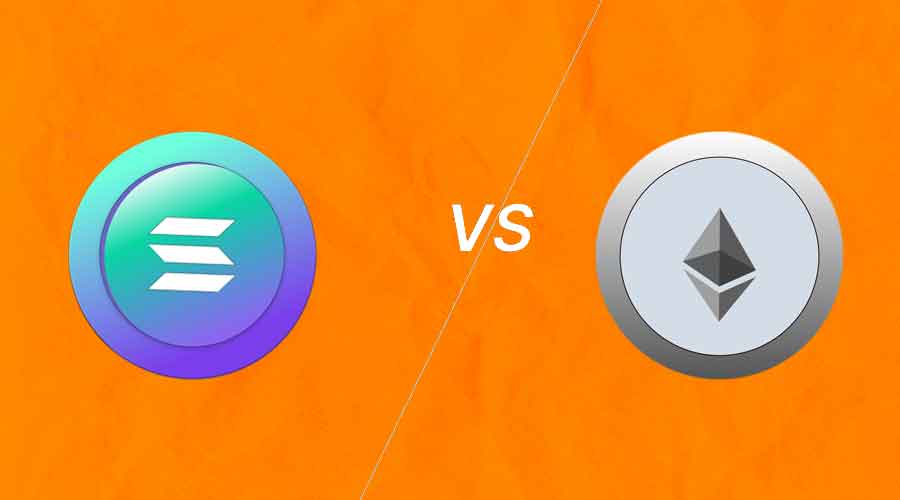 “Ethereum vs Solana: The Battle of Blockchain Titans – Speed, Scalability, and Smart Contracts Unveiled”
“Ethereum vs Solana: The Battle of Blockchain Titans – Speed, Scalability, and Smart Contracts Unveiled”
Intro
In the rapidly evolving realm of blockchain technology, Ethereum and Solana have emerged as two major contenders, each with distinct attributes and capabilities. Ethereum, a pioneering platform, revolutionized the concept of smart contracts, enabling decentralized applications and digital agreements to operate seamlessly on its network. However, it faced challenges such as scalability and high gas fees. In contrast, Solana, a newcomer to the blockchain scene, places a strong emphasis on speed and scalability, offering the promise of handling an impressive volume of transactions without compromising on performance. In this article, we embark on a detailed comparison of Ethereum and Solana, focusing on the crucial aspects of speed, scalability, and smart contracts, to help you make informed decisions in the world of blockchain technology.
Ethereum: The Pioneer of Smart Contracts
Ethereum, launched in 2015 by Vitalik Buterin, has been at the forefront of blockchain innovation. It introduced the concept of smart contracts, self-executing contracts with the terms of the agreement directly written into code. Ethereum’s native cryptocurrency, Ether (ETH), plays a crucial role in powering these contracts.
Key Features of Ethereum:
Smart Contracts: Ethereum’s primary innovation is smart contracts, which enable decentralized applications to run on its blockchain. These contracts have applications in a wide range of industries, from finance to supply chain management.
Ethereum Virtual Machine (EVM): The EVM is the runtime environment for executing smart contracts. It allows developers to write code in various programming languages, making it accessible to a broader developer community.
Challenges Faced by Ethereum:
Scalability: Ethereum has faced scalability issues, leading to network congestion and high gas fees, which can make transactions expensive and slow.
Transition to Proof of Stake (PoS): Ethereum is in the process of transitioning from PoW to PoS (Proof of Stake) to improve scalability and reduce energy consumption.
Solana: The Scalability Solution
Solana, launched in 2020 by Anatoly Yakovenko, was created with a focus on scalability and speed. It aims to provide a platform for decentralized applications and services that can handle high transaction volumes without compromising on performance.
Key Features of Solana:
Scalability: Solana is known for its high scalability, capable of processing over 65,000 transactions per second (TPS). Its unique approach to consensus, called Proof of History (PoH), and the use of a high-performance programming language, Rust, contribute to its impressive throughput.
Low Transaction Fees: Solana offers low transaction fees, making it an attractive platform for developers and users looking to avoid high gas fees experienced on Ethereum.
Smart Contracts: Solana supports smart contracts, allowing developers to create decentralized applications that can take advantage of its scalability and high throughput.
Interoperability: Solana is designed to be interoperable with other blockchains, making it a versatile platform for connecting different blockchain ecosystems.
Ethereum vs Solana: A Comparison
Now, let’s dive deeper into the comparison of Ethereum and Solana based on key factors.
1. Speed:
- Ethereum: Ethereum currently processes approximately 15-45 transactions per second. While it was the first to introduce smart contracts, the network’s speed has been a limitation.
- Solana: Solana, with its focus on high throughput, can handle over 65,000 transactions per second, offering significantly faster transaction speeds.
2. Scalability:
- Ethereum: Ethereum’s scalability has been a long-standing issue, leading to network congestion and high gas fees. The transition to Ethereum 2.0, which includes a move to PoS, aims to address these concerns.
- Solana: Solana was designed with scalability in mind. Its architecture and consensus mechanisms are geared towards providing a highly scalable blockchain platform.
3. Smart Contracts:
- Ethereum: Ethereum pioneered the concept of smart contracts and boasts a large ecosystem of DApps and DeFi projects.
- Solana: Solana supports smart contracts, making it a suitable platform for developers to build decentralized applications while benefiting from its speed and scalability.
4. Security and Decentralization:
- Ethereum: Ethereum, with its established PoW network, has a high level of security and decentralization.
- Solana: Solana’s approach to security and decentralization is still evolving, and it uses a unique consensus mechanism with PoH and PoS.
5. Development Ecosystem:
- Ethereum: Ethereum has a well-established developer ecosystem with a large community of contributors, making it a fertile ground for innovation.
- Solana: Solana’s developer community is growing rapidly, with a focus on building applications that can leverage its scalability and speed.




